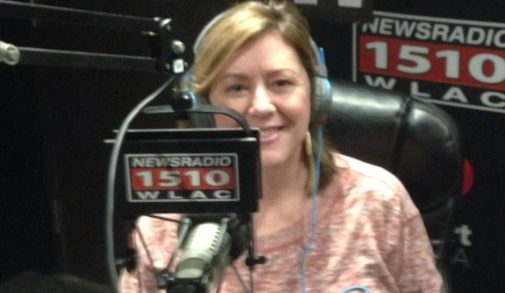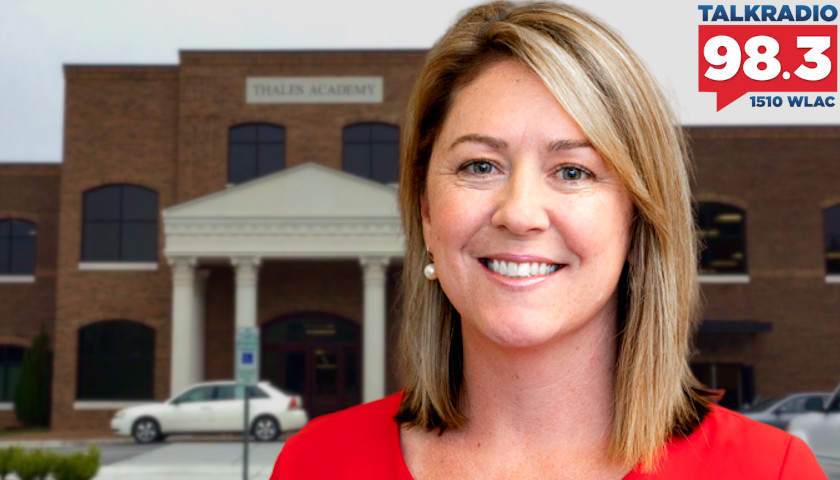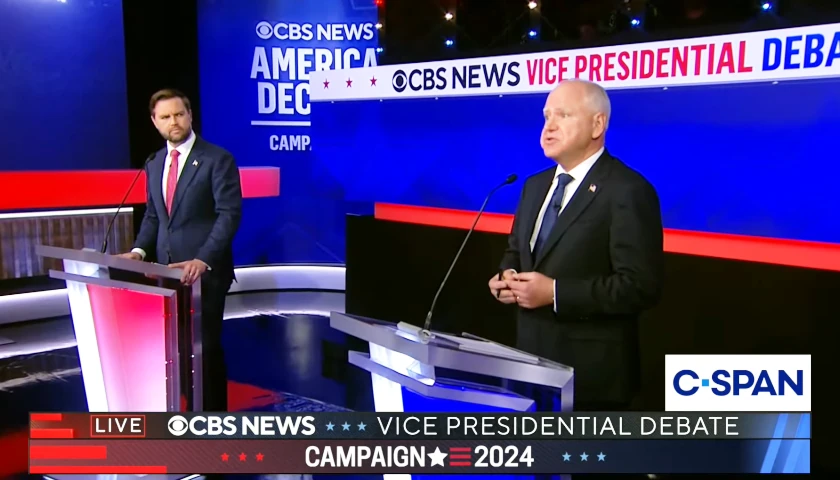Live from Music Row Tuesday morning on The Tennessee Star Report with Michael Patrick Leahy – broadcast on Nashville’s Talk Radio 98.3 and 1510 WLAC weekdays from 5:00 a.m. to 8:00 a.m.– host Leahy and in-studio guest State Senator Kerry Roberts (R-Springfield) were joined by new all-star panelist and Thales Academy administrator Rachael Bradley who is in town to speak to parents tonight at 6:30 p.m. about Thales Academy K-3 coming to Franklin, Tennessee in July. If you have not signed up yet, you can do so now at www.thalesacademy.org/franklin.
Michael Patrick Leahy: And we are delighted to welcome to our microphones here on Music Row studio, the first time in the studio with us. A new all-star panelist. The administrator for Thales Academy – Franklin, Rachel Bradley. Welcome to the Tennessee Star Report Rachel!
Rachael Bradley: Good morning Mike. Thank you for having me.
Leahy: Well, this is an exciting day for us I think. This is really the first time that you’ve been on the air with us to talk about Thales Academy. So tonight, you will be leading the program at the parent informational meeting at The Gate Community Church on 3835 Carothers Parkway at 6:30 pm.
And you’ll be talking about Thales Academy and Direct Instruction. I think this is going to be a tremendous event. Tell us a little bit about your background and how you got into education and Thales Academy.
Bradley: OK. Great. My mom was a school teacher for 30 years. So I grew up in an education household.
Leahy: Did you grow up in Virginia?
Bradley: I grew up in Blacksburg Virginia. Go Hokies! I’ll probably say that every time you meet with me.
Leahy: Go Hokies! They are a great ACC team.
Bradley: Absolutely.
Leahy: We have a connection there because of a long time former Virginia Tech basketball coach by the name of Frankie Allen. Remember this Kerry? And he then became the basketball coach at Tennessee State. A little bit of a connection there I think.
State Senator Kerry Roberts: I’m just stuck thinking about the fact that she’s from Virginia and she’s fleeing Virginia to come to Tennessee.
Bradley: By way of North Carolina.
Roberts: Oh. OK. I was thinking all of the stuff going on in Virginia right now, no wonder you coming to Tennessee.
Leahy: We are delighted to have you in Tennessee. So tell us a little bit about your background. Your mom was a teacher in Blackburg, Virginia…
Bradley: Right. I got my undergraduate degree in family and child development from Virginia Tech. Then I left and lived in Cincinnati for two years and taught preschool. After I did that, I definitely wanted to be in the classroom and went back to Virginia Tech to earn my master’s degree in education.
Leahy: What was it like to move from Virginia to Ohio? It’s a little bit of a…
Roberts: Blacksburg is beautiful.
Bradley: Blacksburg is beautiful but it is a small town and I went to a big city.
Roberts: You did. You know, Cincinnati is nice. It’s a lot different than it was 20 years ago when you think of it as the rust belt and industry and so forth.
Leahy: But you’ve come back to the South since.
Bradley: I’ve come back to the South.
Leahy: You got a master’s degree at Virginia Tech.
Bradley: I earned my master’s degree and my teaching license. And I had a friend who was teaching at Franklin Academy in Wake Forest, North Carolina.
Leahy: It was not in Franklin Tennessee. It just happens to be called Franklin Academy in the Raleigh-Durham, North Carolina area.
Bradley: Yes.
Leahy: Was that a charter school?
Bradley: That was a charter school. It had the same direct instruction curriculum. So that was my first teaching experience in a K-5 classroom and I taught kindergarten there for four years.
Leahy: So let’s talk a little bit about direct instruction. I found out about this and I said, ‘oh my goodness’, this must be the answer because you know, education is not working out so well with all the common core standards. Kids aren’t learning to read and write. Take a minute and just describe what direct instruction is.
Bradley: Direct instruction is a teaching methodology. It’s got 40 plus years of research behind it and is a data-driven program. Really the two key components of direct instruction are, maximizing high time on task and student engagement.
Leahy: In other words, when you say high time on task, kids aren’t just sitting there doing nothing looking at the ceiling?
Bradley: Correct. No. Not at all. This is a teacher-led program. The students are engaged the whole time. There’s a great teacher-student flow to any lesson that’s taking place in our classrooms and we’re using every minute of the school day.
Leahy: As a teacher to lead, you’ve got to be high energy to lead it as a teacher.
Bradley: You do. You absolutely do Mike. I purposely seek out teachers who I know are high energy, passionate, and ready to get in there and get to work.
Leahy: What it’s not like, remember the old Charlie Brown where the adults would go whah whah whah whah? It’s not like that at all, is it?
Bradley: No. Not at all.
 (Commercial break)
(Commercial break)
Leahy: It is quite a challenge to move a family, your husband and you have a son who will be in third grade?
Bradley: Yes, sir.
Leahy: He’s currently in second grade.
Bradley: Yes.
Leahy: So this is personal. You’re really stepping up here. You’ll be running the school. You, of course, have all of this experience as a direct instruction teacher. Now you’re adding the administrative aspect. This is a big big move for you, isn’t it?
Bradley: It is Mike. It’s a big move. I couldn’t take it on if I didn’t wholeheartedly believe in the program.
Leahy: Now see this comes across loud and clear. And of course we here at the Tennessee Star Report, you know we’ve set up our own little Star News Education Foundation that wants to focus on seven key things to improve education and return it back to its leadership position in the United States.
And the number one thing is direct instruction for K-5 education. You’ve made a believer out of me. And so tell us a little bit more about the power of direct instruction in teaching reading, writing and arithmetic to kids in K-3,4, and 5.
Bradley: Well, in the K-5 stage is what we call the grammar stage and that’s the foundation of everything that comes next. And that is all those basic skills. Phonics, arithmetic, and grammar. And it’s so important that you have that strong solid foundation. And that’s what we’re able to provide.
Leahy: So when you say grammar, you’re talking about the school will ultimately be a K-12 school here a couple of years from now.
Bradley: Correct.
Leahy: It will grow each year. When you say grammar, you’re talking about the three steps of classical education?
Bradley: That’s right.
Leahy: The first being grammar where you are using direct instruction so kids know how to read and write and do arithmetic. The next stage is logic?
Bradley: Right.
Leahy: And then the next stage is rhetoric?
Bradley: Correct.
Leahy: A classical education is what the kids at Thales will receive.
Bradley: That’s exactly right. And I really today just want to really focus on the grammar stage because that’s my wheelhouse because that’s what we do so well.
Leahy: Don’t you love it when a teacher says she has a wheelhouse? (Bradly chuckles) And she does. The direct instruction wheelhouse. That’s Rachel Bradley at Thales Academy.
Roberts: You know what I’m hearing here? There are a lot of familiarities. I’m 58 years old and I think about when I was a kid and the age when I was in elementary school in the 1960s. And a lot of this kind of sounds familiar to me. Before…
Leahy: Before common core and the disaster that is taking student, tests results down down down.
Roberts: You know, we didn’t recognize it at the time but in the 70s there was a lot of socialist influence in the United States education. And now we look back and recognize it. So I love hearing this.
Leahy: So tell us again about the mechanics of direct instruction. Get that base. One of the things that Bob Luddy says about creativity, I think there is another person who he took it from Chesterton maybe said that ‘creativity begins at the edge of knowledge.’ And you have to have knowledge first for it right?
Bradley: Yes. Absolutely. So all of our curriculum is carefully scripted. And what that does is ensure consistency and accuracy. We can bring any teacher in and train her in the Thales way. And when new teachers are given that solid foundation and they don’t have to come in and design everything from scratch then they can start with what we’ve given them and figure out how to make it engaging for the kids sitting in the classroom in front of them.
Leahy: So when you say it’s scripted, this is a tried and true method that’s been around for about 50 years.
Bradley: Yes.
Leahy: The founder who was a professor at the University of Illinois in the 1960s then went to the University of Oregon. There are 50 years of evidence that this is the best way to teach reading, writing, and arithmetic.
Bradley: Absolutely. And you really just have to see it in person to understand how well it works.
Listen to the full third hour here:
– – –
Tune in weekdays from 5:00 – 8:00 a.m. to the Tennessee Star Report with Michael Patrick Leahy on Talk Radio 98.3 FM WLAC 1510. Listen online at iHeart Radio.
Photo “Rachael Bradley” by Thales Academy. Background Photo “Thales Academy” by Zachpw. CC BY-SA 2.0.





